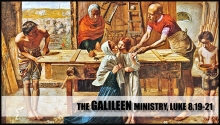
While teaching at an unknown location Mary and some of Jesus’ brothers came to see Jesus. They had difficulty getting through the masses so they sent word of their presence through the crowd. When word reaches Jesus that his family is waiting to see him, he responds in a way many consider cavalier and unkind. “My mother and my brothers,” he replied, “are those who hear the word of God and do it.” Since the gospel writers never tell us what happens after, it appears that perhaps he completely ignored his mother and brother. Does this sound like something Jesus would do?
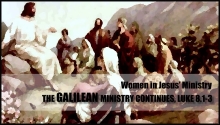
Luke takes a time-out to celebrate the benefactors of Jesus’ ministry, people whom many may be surprised to hear of. While Jesus traveled throughout Galilee with the 12 disciples, they were financed by a group of women, some known to us and some not. It specifically states these women provided for Jesus and his men out of their own means. This made me pause, as I’d always heard from the pulpit that women in first century Israel were oppressed and treated as property. Where did this idea come from? Certainly not from the pages of the Bible!

A struggling believer asked his devout friend to go to a strip bar. “Never going to happen,” the friend replied. “Why, because you’re so holy?” he retorted venomously. “No,” the Christian responded, “just obedient.” Along with all the characteristics of Kingdom Citizens -- a perspective based on future glory, love for enemies, generosity, humility and others -- there is one more piece of our lives that needs to be turned upside-down. In Luke 6.27 Jesus asks a question: “Why do you call me Lord and not do what I say?” This lesson is about how ordinary people ought to stop obeying sinful desires and start obeying God.

As many before me have pointed out, the term translated “Blessed” in both Matthew and here in Luke chapter six, is more accurately rendered “happy” as it relates to humanity; historically, “blessed” is a term only used of divinity. This is important as it brings the message down from seemingly holy heights where we tend to over-spiritualize everything down to a level of life we are only too familiar and comfortable with. For this study then, the wisdom formula begins with “Happy are…”, followed by a group who seems unfortunate and ending with a promise of future glory.

Back in June we looked at two legal cases that were supposed injustices and gaining a lot of attention on Facebook and Twitter. We discovered at the time that one of those cases was just indeed, but the other quite the opposite. That later case is the affair of Brock Turner, a 20-year-old college student who was arrested for raping several girls on campus. During the course of trying the case the charges were reduced to three charges of sexual assault. The convictions carried a possible 14 years in prison. He was convicted on all counts but received a six-month sentence, three of which are to be probation.
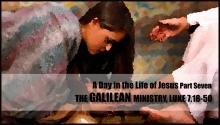
As the day was getting on and the sun low in the sky, the disciples of John the Baptist (who was in prison at the time) came to Jesus to ask a question for their teacher. They wanted to know if Jesus was in fact the Messiah, or if the Messiah were yet to come. Their question was quite direct, yet Jesus didn’t answer their question likewise, answering instead in a cryptic manner leading some (myself included) to believe Jesus may have been communicating more than the answer to their question. Was Jesus speaking in code?
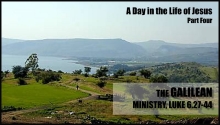
From what we’ve been reading are we to assume the indicators of Christian living are being spiritually poor and hungry, unhappy and hated? Hardly. Rather, people will know we belong to God when we can be happy in current difficulties because of our focus on future redemption. This focus on our eternal life and destiny carries into every area of life.
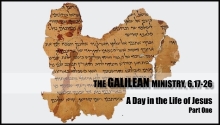
We have been able to discern what a typical Sabbath day was like for Jesus during his ministry years, including a time of teaching and sometimes healing in the synagogue followed by a walk and supper at someone’s home. Over the next couple chapters (6.13-7.50), we get a detailed look at a typical day in the life of our Savior. Due to the length of the writing we cannot possibly cover everything in a single post, so we’ll be breaking it up but try to keep in mind that these are not random teachings of Jesus, they represent roughly a 12-hour period.

Following the disclosure of women assisting in Jesus’ ministry, Luke records a familiar parable about a farmer sowing seed. We’ve mentioned before four types of people who show up to hear Jesus preach (the 12, other disciples, people needing healing or who want to witness miracles, and the religious authorities); in this parable Jesus tells us four responses people have to his teaching about the kingdom and his right to rule. But this message, while spoken before everyone, isn’t for everyone to understand. Such is the nature, and purpose, of parables.
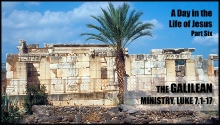
His sermon over, Jesus left the plains and entered Capernaum, a city on the northwest shore of the Sea of Galilee and a major trade center for the region. This is still the same day that Jesus chose the disciples, which occurred after staying up all night in prayer over that decision. He had to be tired, even so there was work to do. Following his teaching he set about proving his message was from God by performing Messianic signs. Luke records these two miracles, a healing and raising someone from the dead, in greater detail than the other Gospel writers.

The second wisdom statement (of four) features another reversal of fortune. In this case the hungry will be satisfied. That’s not the only similarity, however. The group Jesus identifies as “the hungry” also has Old Testament roots, also in Psalms (37.16-19) and elsewhere (Psalm 107.9, Isaiah 32.6-7; 58.6-7; Ezekiel 18.7,16), and that those who hunger are again “the godly”. In this passage we see that the wicked indeed prosper here and now, but the godly are more valuable because they are important to God. In a day in which famine will affect both groups, God will provide for his people.
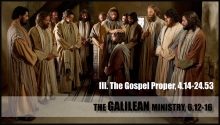
In a single paragraph Luke tells us of the completion of Jesus choosing the 12 disciples. It begins with one of the many accounts of Jesus withdrawing from the crowds to pray. He prayed not for a few minutes or hours, but all night, so important were the decisions. He was entrusting these men with the future of his ministry. Even Judas, the only one Luke comments on, had a vital role to play. Luke gives us names, and the details of these men and their faith will have to wait, becoming known only as we read the rest of the story.

